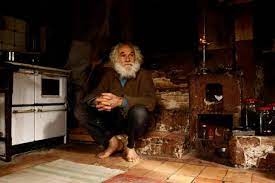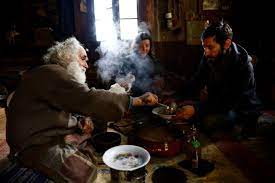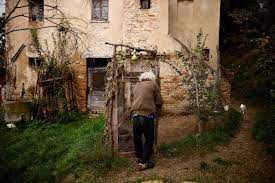Italy: No energy worries for ‘harmonious walnut tribe’

Cupramontana: Fabrizio Cardinali, 72, does not crave the bright city lights. Indeed he has no use for electricity and for more than half a century has lived entirely off the grid.
That makes him one of the few people in Europe unconcerned about rising energy costs this winter.
Cardinali, whose long white beard makes him look like Karl Marx, the poet Walt Whitman or a slimmed-down Santa Claus, lives in a stone farmhouse in the hills of the Verdicchio wine country near Ancona, on Italy’s eastern Adriatic coast.

“I was not interested in being part of the world as it was going. So I left everything – family, university, friends, the sports team, and set off in a completely different direction,” he said, sitting in the kitchen and wearing patched corduroy trousers.
“Giving something up is not masochistic. You give something up to obtain something else that is more important,” he said.
Right now, he has two house mates, a rooster, three chickens and a cat in a community he calls “The Tribe of the Harmonious Walnuts”.
Cardinali, Agnese, who has been living at Cardinali’s house for the past two years, and Andrea, who spends the week there but goes home each weekend to look after his mother, grow their own fruits and vegetables, olives for olive oil, and keep bees for honey. A local cooperative sells them sacks of legumes, cereals and wheat, which they grind to make their own bread. “I feel privileged to have the freedom to choose my freedom,” said Agnese.
Cardinali and his house mates, who gave their names only as Agnese and Andrea, rely on a wood-burning stove for cooking and warmth, and read by lamps fuelled with used cooking oil donated by neighbours.

“I feel privileged to have the freedom to choose my freedom,” said Agnese, 35, who moved in two years ago. Andrea, 46, spends the week there but goes home to Macerata, about 50 km (31 miles) away, each weekend to look after his mother.
The “harmonious walnuts” grow fruit and vegetables, olives to produce olive oil, and keep bees for honey. A local cooperative sells them sacks of legumes, cereals and wheat, which they grind to make their own bread.
When possible, they trade any surplus production for anything they need. Although some people have dubbed him “the Hermit of Cupramontana,” Cardinali says he is not a hermit. Instead, he believes life is best lived in small communities.
His first piece of advice for anyone tempted to follow his example is: “Throw away your so-called smart phone.”
Cardinali occasionally travels short distances to visit friends, take olives to a stone press to make oil, and walks or hitch-hikes to the nearest town to have a coffee with locals or visit the doctor.
“I’ve been living this way for about 51 years and I have never regretted it. For sure, there have been difficulties, but they never made me think that I made the wrong choice or thrown it all away,” he said. “Absolutely not.”





